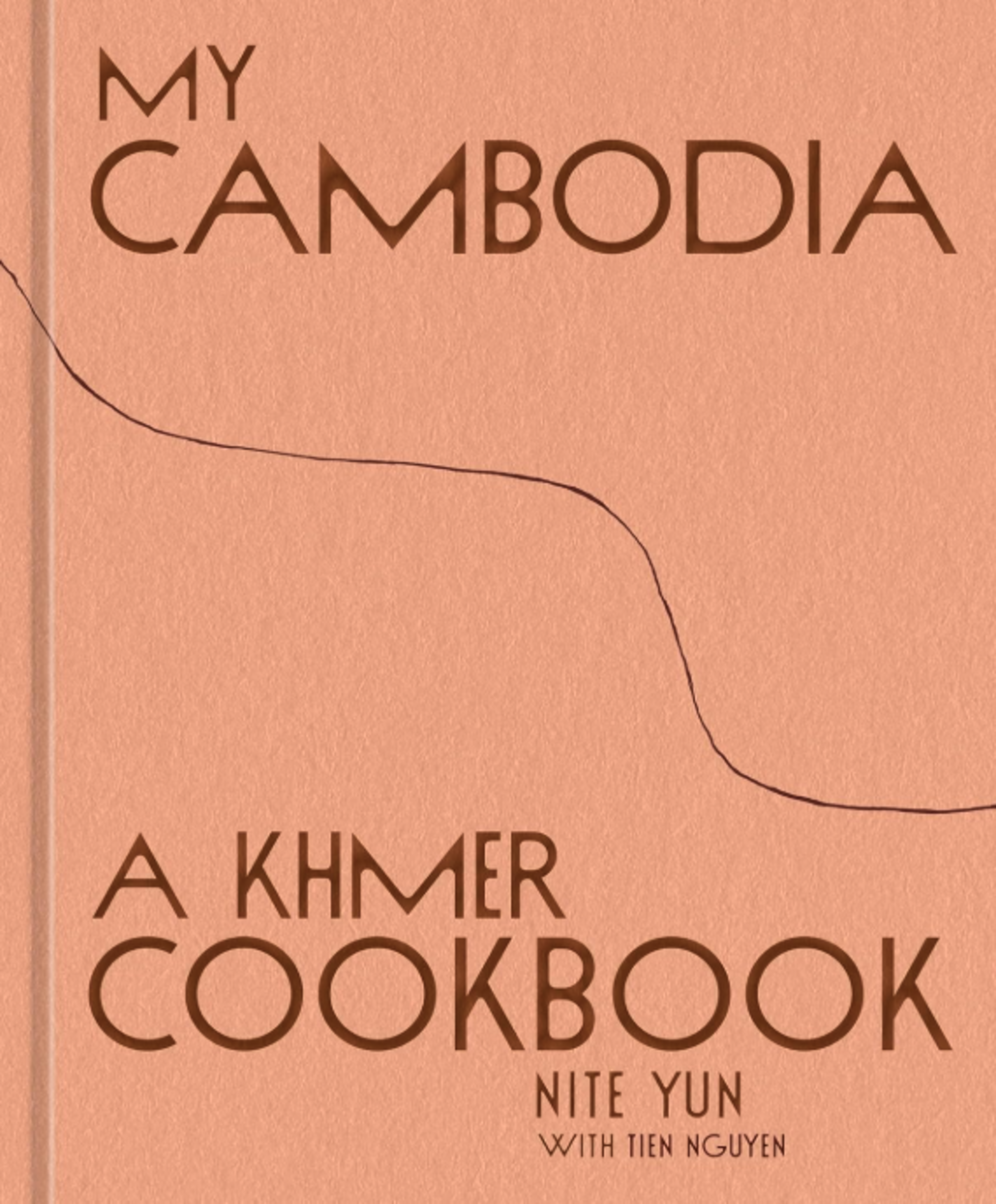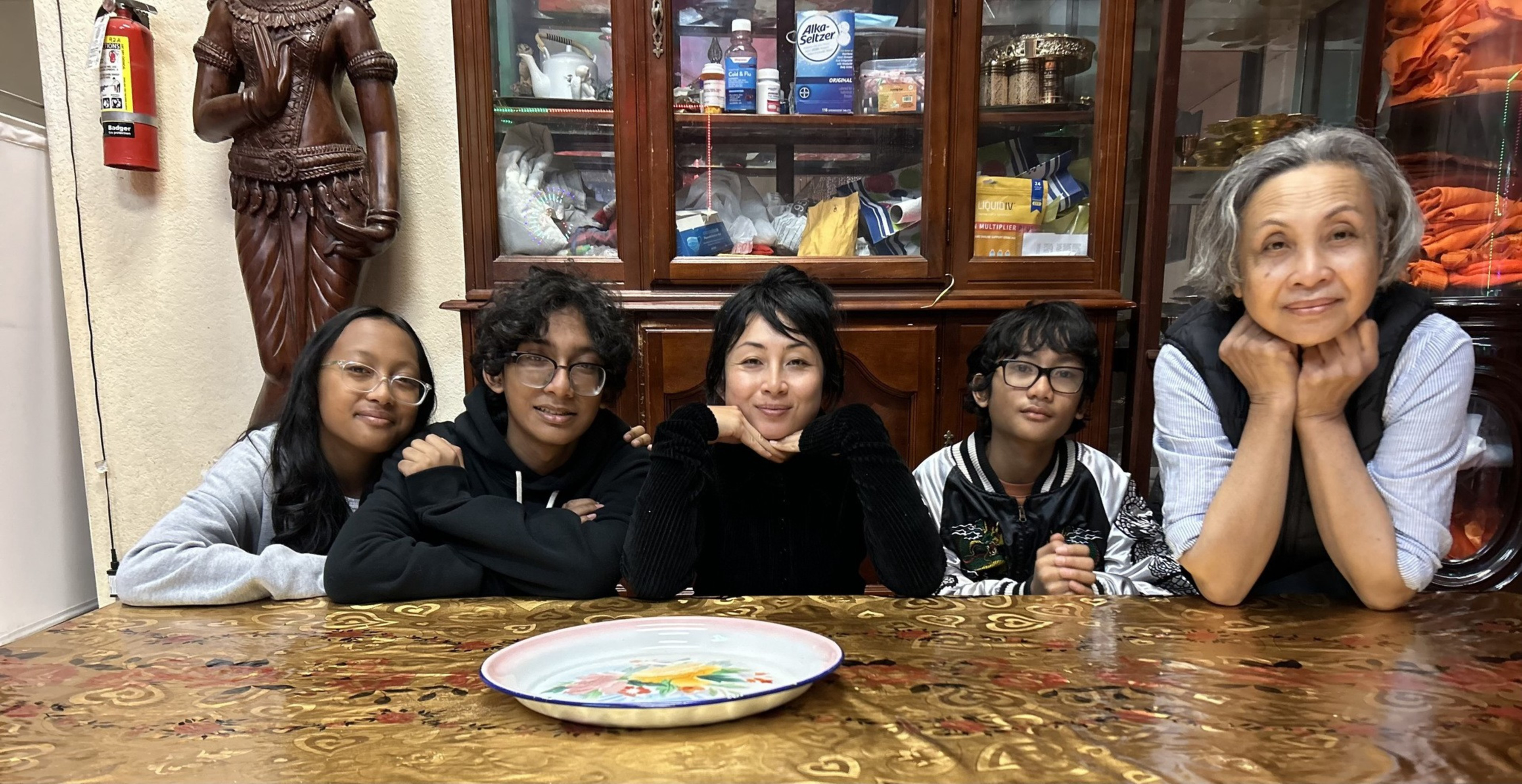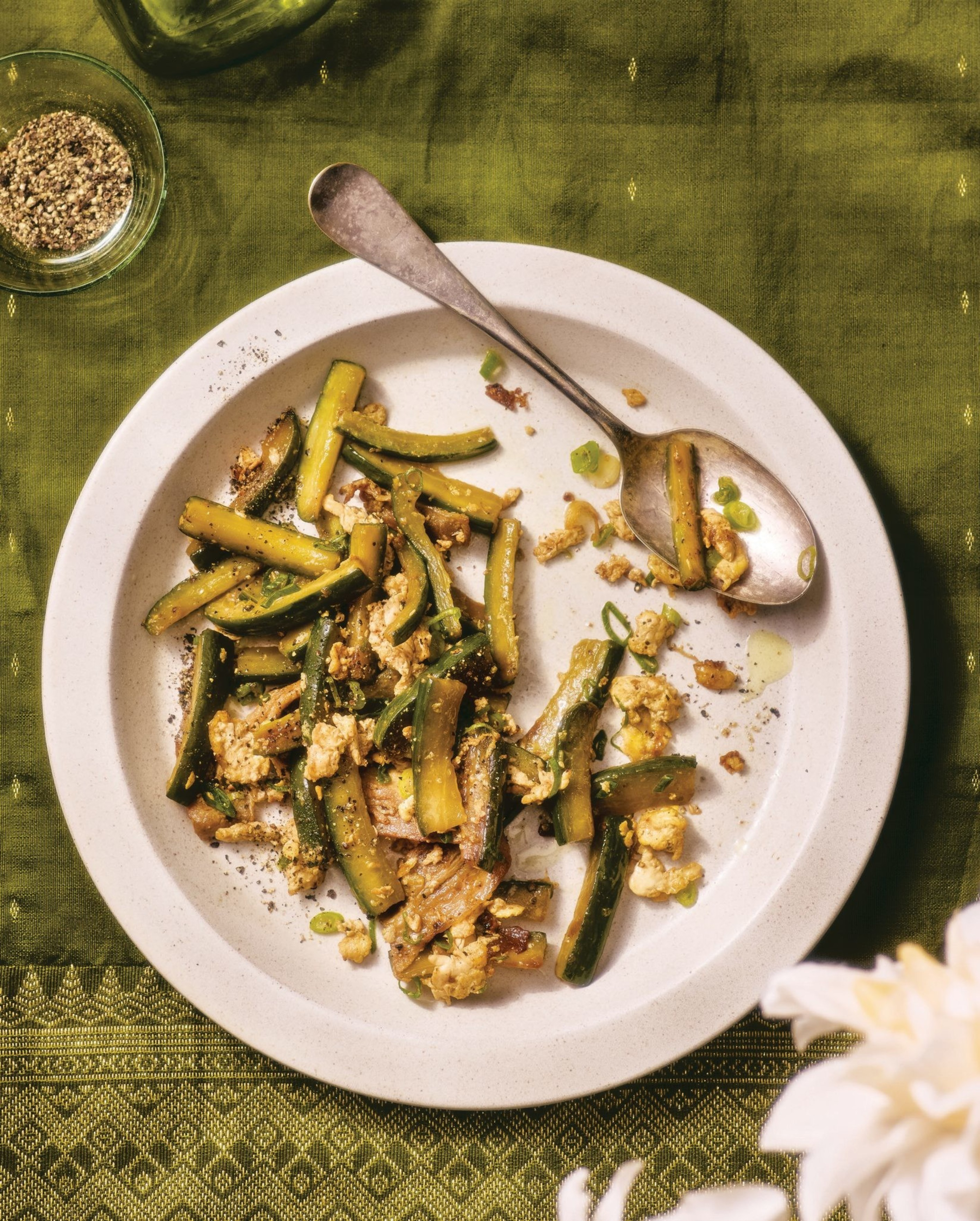There are cookbooks you pull off the shelf when you just need to get dinner on the table, and there are cookbooks that speak to a bigger story. The kind you sink into, maybe even tear up over, because they remind you why food matters.
“My Cambodia,” the new cookbook from chef Nite Yun, owner of Lunette, is one of the latter. I found myself devouring each page — and not just for the recipes.
Beautifully designed, with quirky, line-drawn illustrations by Yun’s friend Nak Bou and luminous photos by local photographer Nicola Parisi, the book feels like a journey of self-discovery as much as a love letter to two of Cambodia’s culinary essentials: prahok, a pungent fermented fish paste, and kroeung, a fragrant mix of lemongrass, galangal, turmeric, shallots, garlic, and lime leaves.
In person, Yun is soft-spoken, but it’s clear there’s a fire in her, a deep independence. After her family fled war-torn Cambodia in 1979, they spent time in a Thai refugee camp before resettling in Stockton in 1984 — one of roughly 10,000 Khmer families who made the same journey (the Khmers are an ethnic group native to Cambodia). Eager to escape her hometown, Yun moved to San Francisco after high school, tried college briefly, then did something bold the moment her first credit card arrived.
“I knew what I wanted to do,” she writes. “I booked a flight to Cambodia.”
It was the place that held the secret to her parents’ pain and their past. It was also a country she’d never laid eyes on.
That trip, as well as mentorship from nonprofit food incubator La Cocina (opens in new tab), led to Nyum Bai, the excellent restaurant Yun opened in 2018 in a funky space in Oakland’s Fruitvale neighborhood.
She had never run a restaurant before, and Cambodian food was unfamiliar to most in the area. But diners got a taste of both new flavors and Yun’s determination. Soon enough, the accolades rained. Food & Wine named Yun one of the year’s best new chefs, Time gave her a spot on its “100 Next” list, and Bon Appétit named Nyum Bai one of the best new restaurants in America. She was a semifinalist for the James Beard Awards and an Eater Young Gun.
Then her father died by suicide. The pandemic came. In 2022, Yun decided to close Nyum Bai. Many might have thrown in the towel, but last summer, Yun returned with Lunette, a counter-service restaurant in the Ferry Building that has earned glowing praise.
“My Cambodia” is a continuation of her journey. It’s humble, reflective, and deeply personal. It’s the next chapter. Yun talked to The Standard about growing up in the troubled Central Valley, chasing her parents’ refugee story, and her mom’s new job as a burger flipper.

Tell me about growing up in Stockton — or as you call it, “Stuck Town.”
It was chaotic. I knew my parents had gone through something, and that became this heavy feeling that I just carried around with me. Also, they were opposites. My mom was resourceful, my dad absent — though I got my love of food from him. He loved exploring mom-and-pop shops, discovering dishes, even Trader Joe’s frozen snacks. Food made him happy.
You eventually unstuck yourself and moved to San Francisco. But do you ever go back to Stockton?
My brothers still live there. I don’t go often; my family visits me. But today, it’s nicer, safer. There are hip coffee shops. Growing up, I felt hopeless — there were meth houses in the neighborhood and drive-by shootings. But there was also an amazing underground food economy because of the immigrants. We’d get papaya salad from a van and soups from people’s apartments. That all shaped me and what I do.
You became interested in food in part to bridge the divide between you and your parents — to learn about their lives in Cambodia.
Dinner was always when we talked. I wanted to learn how to make Cambodian food, so I asked my mom. At first, she gave short answers, but eventually, she told me stories connected to dishes. I’d ask her things like, “Did you learn this from grandma?” Food is an incredible way to really soften any situation and allow people to open up. Learning about them was also a way to learn about myself and my identity.
What did you discover about them?
Through my cousins in Cambodia and the villagers, I learned that my dad’s side of the family made moonshine for fishermen — my aunt bragged that it was the best moonshine. My dad was apparently stylish, worked as a butcher, loved Cambodian rock and roll, and learned to fix motorcycles from the Japanese. It made me see him as human, not just my dad, who was hiding something.
And your mom?
Much harder. Relatives were hush-hush. Before the war, she was considered a beauty queen and had a puppy she named Apollo, after the moon landing. My family’s cousins said she was the strongest woman they know. One story I found out: When she was pregnant with my brother, she purposely walked into the jungle, which was full of land mines, because she couldn’t take it any more. But she survived and believed she had to live for him.

You were born in a refugee camp in Thailand and immigrated to the U.S. at age 2. When did you visit Cambodia for the first time?
When I was 24. I met my grandmother for the first time then. Before that, we’d only spoken briefly on the phone.
Did your parents ever speak directly about the war?
My dad was always depressed, like, absent and empty. He couldn’t hold a job. Near the end of his life, when his health started to decline, he started muttering about soldiers coming. He was diagnosed with PTSD — something no one had ever considered before. He told me he regretted not spending more time with us.
When did your father die?
In late 2018, my dad took his own life. Nyum Bai had been open about nine months. The accolades were coming in. I had to bury it inside me, run the restaurant, lead 25 staff, and deal with the awards. It was such a shitty time. People would say, “Aren’t you happy?” and I didn’t even know how to process it.
How did your mom handle your father’s death?
She was shocked. My dad left an apology letter under her pillow, which gave her closure. But she has become really independent. She’s in her 70s now, and she enjoys the grandkids, my nieces and nephews. She’s moved from Stockton to Willits, where she works with her Cambodian friend flipping burgers at a burger joint. Her latest obsession is smashburgers.
Has she been to Lunette?
She’s been a few times with the grandkids. Her smile was bigger. She told my friends she’s proud of me. With Nyum Bai, she was worried. With Lunette, she sees success and feels relaxed. She only said the soup was a bit salty.
Through your restaurants, through your book, you’ve been searching to find your mom — all the while she’s been right here. How does it feel now?
I’ve accepted our relationship as it is. I tried, she tried. I don’t push anymore. I’ll take what she gives. I’ve made peace with it.
If someone wanted to start cooking Cambodian food, what essential pantry items should they get?
Prahok [fermented fish paste], fish sauce, oyster sauce, kroeung [lemongrass paste].
And starter recipes?
Chicken and caramelized ginger. Charred eggplants with pork and shrimp. Cabbage salad with chicken, herbs, and peanuts. Amok [fish soufflé].
What’s next?
I’m starting a cookbook club with my friend Carla Mannix, a friend and designer who I work with. I want people nationwide to join. On tour, people — including young Cambodian Americans wanting to connect to their heritage — were so curious about Cambodian food. That inspired it.
Have you thought about how you and your mom are both cooking in restaurants now, but she’s flipping burgers, and you’re making Cambodian food?
That’s funny. I really haven’t. I just know she’s happy. When I peek through the to-go window at the burger place, I can just see that she’s having a good time.
Recipe: Stir-fried cucumbers with black pepper and egg (serves 4)
This is an easy and quick recipe that’s packed with flavor, and it’s even good for you! My mom made this stir-fry for us using winter melon, but when I started to cook for myself, I decided to use more manageable cucumbers instead. I tend to use English cucumbers for this, but use any variety you like. Sliced pork belly makes the stir-fry more substantial, but you can omit it, especially if you have other proteins on the table. Whatever you do, the key to the dish is that final bit of ground black pepper right at the end. That warm pop of spice really completes the dish.

In a wok or large skillet over high heat, heat the oil. When the oil begins to shimmer, add the garlic and sauté until fragrant, about 30 seconds. If you’re adding pork belly, now’s the time. Sauté the pork until the slices are nice and browned, about 5 minutes. Add the oyster sauce, fish sauce, sugar, and ½ teaspoon pepper and stir everything all together. Add the cucumbers and sauté until they’ve softened, 3 to 5 minutes.
Crack the eggs into a small bowl and beat them lightly with a fork or chopsticks. Make a well at the very center of the wok and add the eggs.
Scramble them right in the well. Once they’ve set, about 2 minutes, sauté everything together for about another 5 minutes, or until well combined. Carefully taste. Add a pinch of salt if you think it needs more seasoning. Top with the green onions and some more pepper. Serve with rice. That’s it! It’s best to eat it up right away, but if you have leftovers, store them in an airtight container and refrigerate for up to 1 day.
Vegetarian and vegan variations: To make this vegetarian, omit the fish sauce and oyster sauce and add salt to taste. To make it vegan, omit the egg, too.
